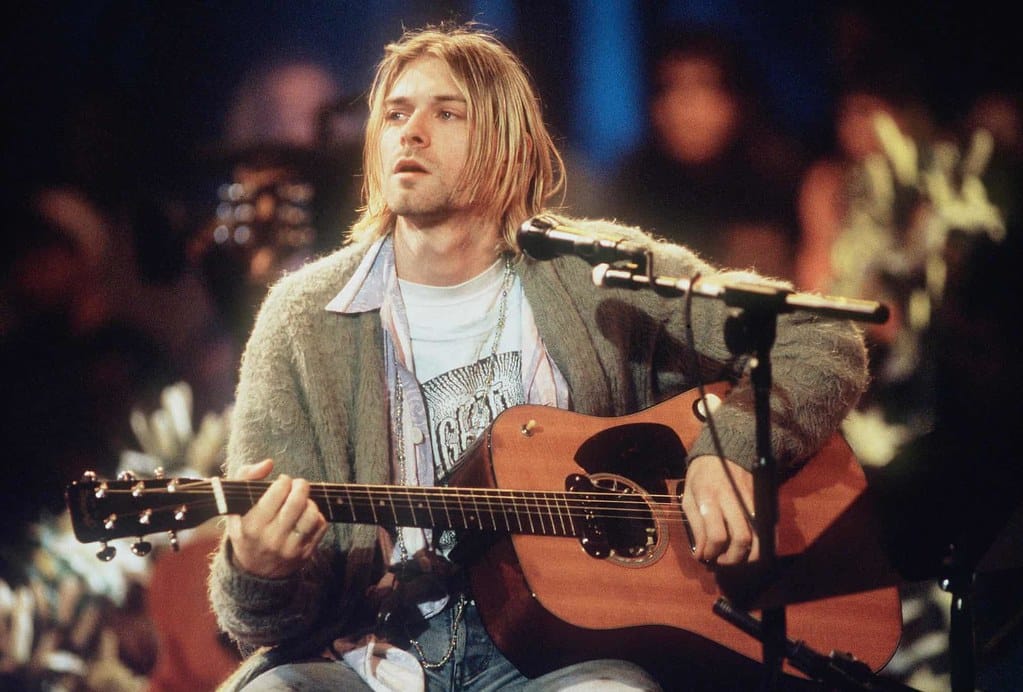Thirty years since his death in April 1994, the impact of Kurt Cobain and his band, Nirvana, and their values, still resonates in today’s culture and music.
Nirvana was everywhere at the start of the 1990s, much like Taylor Swift’s omnipresence today. But unlike Swift, who has embraced and mastered the business side of her fame, Cobain was very much the anti-superstar of his time.
While Nirvana was certainly at the very top of the industry, headlining sold-out festivals, Cobain clearly felt uncomfortable being in the corporate music business. He expressed this discomfort in many ways, from merchandise emblazoned with the words “corporate rock whores” to his rows with MTV and journalists. No Swift-style media savvy slickness here.
Since 2010, the person responsible for Cobain’s name and image rights has been his daughter, Frances Bean Cobain. Nirvana LLC, meanwhile, is managed by a team including original band members Dave Grohl and Krist Novoselic.
These rights are expertly managed and controlled in a way that benefits from hindsight, showing an understanding of what Nirvana stood for which would scarce have been possible when the band was active, or Cobain still alive.
I’ve often said that Nirvana was the last band to reach the very top on its own terms. It didn’t hurt that they embodied the rags-to-riches type stories the press love so much. Cobain had an unhappy childhood and his art was a solace while he worked shifts as a janitor, relying on his girlfriend to fund his band.
Cobain’s relationship with fellow musician Courtney Love also attracted a lot of snide celebrity journalism attention, as did his struggles with his mental health and addiction. Looking back at some of the supposedly supportive headlines of the time, it is clear how the press perpetuated myths and heaped pressure onto an already vulnerable Cobain.
Today it’s not at all uncommon for artists to cancel or postpone shows and tours to protect their own mental health. Fans no longer tend to see this admission as weakness.
Cobain’s death by suicide paved the way for the press and fans alike to discuss the mental health of musicians in a more serious way.
It is important to note that his final couple of years saw Cobain battle addiction and depression. Working with him would clearly have been a lot of fun, and yet very difficult. For the five to six years that Nirvana shined, they shined very brightly. And it has to be said, they rocked. Their music was simple, no frills, rock and roll.
That the band didn’t tour with Guns N’ Roses in 1992 may be a blessing for purists. Nirvana’s music was an authentic antidote to the hair metal which had dominated rock music in the few years prior. Cobain took time off with illness while they were supposed to be on that tour. In reality, Courtney Love states in the 2015 documentary Cobain: Montage of Heck, he just wanted to “stay and home and shoot up”.
The band’s influence on fashion can also still be felt. Particularly in the proliferation of blokes wearing dresses in heavy rock bands like Idles, as Cobain often did on stage.
The iconic ‘Flower Sniffin’, Kitty Pettin’, Baby Kissin’, Corporate Rock Whores’ band T-shirt, now sells for over £2,000. But in recent years, Nirvana LLC has granted rights to print new merchandise to several affordable brands, in keeping with Cobain’s anti-elitist values.
Brand Nirvana today is clear on its values. It is hard not to believe that Cobain would have something to say about today’s identity politics (Cobain once declared he was “gay in spirit and … probably could be bisexual” and called himself a feminist). A man for our times, in his times, so to speak.
As an expert in the music industry (particularly the indie side), it is clear to me that Cobain would remain a marketer’s dream in 2024. Thankfully, the custodians of the Cobain brand continue to advance and protect his thoughts and ideas long after his tragic death at just 27.
is Senior Teaching Fellow, Music Management, University of Southampton. This article is republished from The Conversation under a Creative Commons licence







Click here to change your cookie preferences